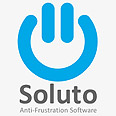
Affecting other companies' products. Soluto logo
Soluto develops toolbar 'antidote'
Startup company says many users apply its software solution to block toolbars with search bars installed on their browser. Leading Israeli firms among 'victims'
A new feature incorporated into test software developed by Israeli-based startup Soluto has an effect on the products of Conduit, an Israeli toolbar developer, and products of other similar companies, Soluto says.
Even if they chose not to uninstall them, many users disable unwanted toolbars, which include search bars, that were installed on their browser.
Soluto, founded by entrepreneurs Ishay Green, Tomer Dvir abd Roee Adler, developed the software solution that prevents inadvertent installation of toolbars on users' browsers and search engine 'hijacking' in which the toolbars define unwanted default search engines.
Conduit generates an annual $300-400 million through its toolbars and marketing apps by incorporating search bars in its toolbars.
The latest version of Soluto's software, released two months ago (and tested by Calcalist), scans the system and shows users which toolbars and add ons were installed on their Microsoft Explorer, Goggle Chrome or Firefox browser, accompanied by explanations, recommended actions and data showing how other users chose to tackle the add on.
The software presents a short description of the toolbars installed on the browser, tells users what the implications of uninstalling the toolbar are and shows the percentage of users who chose to do so.
Conduit's toolbars do not carry the company's brand name but the name of the content sites for which they were developed. Soluto's knowledgebase shows that 33% of the users who installed Conduit's Zinga toolbar and consulted in Soluto's software, disabled the toolbar on the basis of its recommendations.
Similar actions were taken by 12% of Soluto's users who installed the toolbar developed by Conduit for Israeli Babylon and the same was done by 37% of the Soluto's users who had installed Conduit's Softonic toolbar.
A similar course of action was taken by 77% of Soluto's users who installed the toolbar developed by Israeli Facemoods founded by Arnon Harish, which enables users to add emoticons to Facebook messages and to email messages.
Similarly, 48% of Suloto's users who had Google's toolbar, 55% who had Alexa's toolbar and 31% of those who had an AVG antivirus toolbar, chose to disable their unwanted toolbar.
- Follow Ynetnews on Facebook










